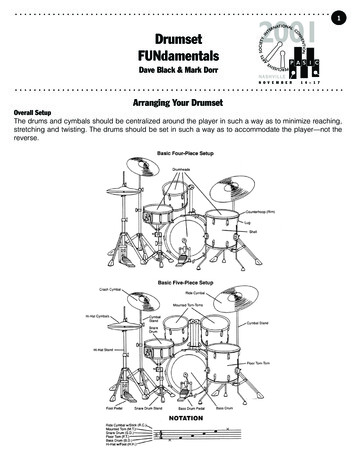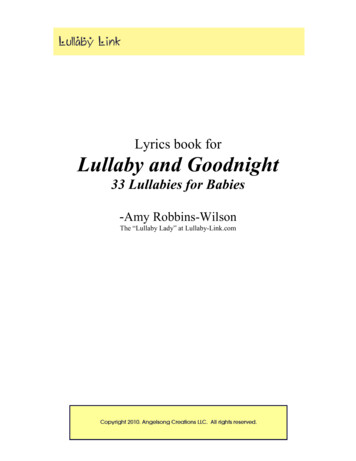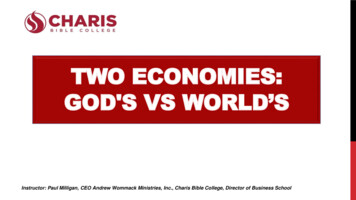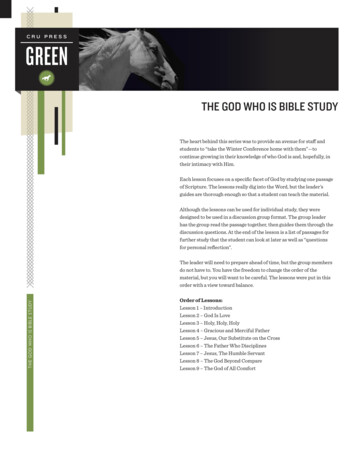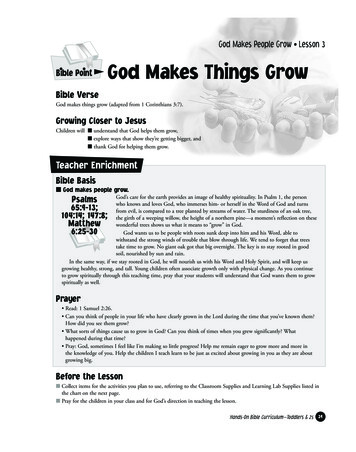
Transcription
God’s Success ManualAn Economic Commentary on ProverbsGary NorthGaryNorth.com, Inc.
copyright, 2007, by Gary NorthThis book is part of a series, An Economic Commentary on theBible. These include the following:The Dominion Covenant: Genesis (1982, 1987)Moses and Pharaoh: Dominion Religion vs. Power Religion(1985)The Sinai Strategy: Economics and the Ten Commandments(1986)Tools of Dominion: The Case Laws of Exodus (1990)Leviticus: An Economic Commentary (1994)Boundaries and Dominion: An Economic Commentary onLeviticus (Full version of previous book, 1994, 2003)Sanctions and Dominion: An Economic Commentary on Numbers(1997)Inheritance and Dominion: An Economic Commentary on Deuteronomy (4 vols., 1999, 2003)God’s Success Manual: An Economic Commentary on Proverbs(2007). This edition: October 5, 2007Priorities and Dominion: An Economic Commentary on Matthew(2000, 2003)Treasure and Dominion: An Economic Commentary on Luke(2000, 2003)Sacrifice and Dominion: An Economic Commentary on Acts (2000,2003)Cooperation and Dominion: An Economic Commentary onRomans (2000, 2003)Judgment and Dominion: An Economic Commentary on FirstCorinthians (2001)Hierarchy and Dominion: An Economic Commentary on FirstTimothy (2003)They are available on www.GaryNorth.com under thedepartment, Capitalism and the Bible.
Table of ContentsPreface . . . . . . . . . . . . . . . . . . . . . . . . . . . . . . . . . . . . . . . . . . . . . viIntroduction . . . . . . . . . . . . . . . . . . . . . . . . . . . . . . . . . . . . . . . . . . 11. Personal Motivation for Holiness (1:1–4) . . . . . . . . . . . . . . . . . 42. The Fear of the Lord (1:7) . . . . . . . . . . . . . . . . . . . . . . . . . . . . 143. Rival Programs of Inheritance (1:8–10) . . . . . . . . . . . . . . . . . . 204. Wisdom and Wealth (1:20–22) . . . . . . . . . . . . . . . . . . . . . . . . 285. Paths of Righteous Judgment (2:69) . . . . . . . . . . . . . . . . . . . . 396. Visible Success (3:1–4) . . . . . . . . . . . . . . . . . . . . . . . . . . . . . . 437. Theocentric Decision-Making (3:5–7) . . . . . . . . . . . . . . . . . . . 498. God’s Rigged Economy (3:9–10). . . . . . . . . . . . . . . . . . . . . . . 539. The Value of Wisdom (3:13–18) . . . . . . . . . . . . . . . . . . . . . . . 5910. Paying Debts Promptly (3:27–29) . . . . . . . . . . . . . . . . . . . . . 6311. Suretyship: Transferring Liability (6:1--2) . . . . . . . . . . . . . . . 6812. Ants and Sluggards (6:6–8) . . . . . . . . . . . . . . . . . . . . . . . . . . 7313. False Signals 6:12–15) . . . . . . . . . . . . . . . . . . . . . . . . . . . . . . 7914. The Light of God’s Law (6:20–23) . . . . . . . . . . . . . . . . . . . . 8415. Restitution and Impartiality (6:30–31) . . . . . . . . . . . . . . . . . . 8816. Law: Natural vs. Creational (8:14–15) . . . . . . . . . . . . . . . . . 9217. The Possible Dream: Wisdom (8:17–19) . . . . . . . . . . . . . . . . 9718. Public Paths or Private Corners (8:20–21) . . . . . . . . . . . . . . 10119. Treasures of Wickedness (10:2) . . . . . . . . . . . . . . . . . . . . . . 10620. Famished Souls and Empty Purses (10:3) . . . . . . . . . . . . . . 11121. Slack Hands and Empty Purses (10:4) . . . . . . . . . . . . . . . . . 11522. Harvesting in Due Season (10:5) . . . . . . . . . . . . . . . . . . . . . 12123. Visible Blessings (10:6) . . . . . . . . . . . . . . . . . . . . . . . . . . . . 12624. The Strength of Capital (10:15) . . . . . . . . . . . . . . . . . . . . . . 13225. Just Wages (10:16) . . . . . . . . . . . . . . . . . . . . . . . . . . . . . . . . 13526. Legitimate Riches (10:22) . . . . . . . . . . . . . . . . . . . . . . . . . . 139iii
God’s Success Manual27. A Matter of Inheritance (10:24–25) . . . . . . . . . . . . . . . . . . . 14428. Unreliable Subordinates (10:26) . . . . . . . . . . . . . . . . . . . . . 14929. Measuring Out Justice (11:1) . . . . . . . . . . . . . . . . . . . . . . . . 15230. Defensive Walls (11:4) . . . . . . . . . . . . . . . . . . . . . . . . . . . . 15631. A Multitude of Counselors (11:14) . . . . . . . . . . . . . . . . . . . 15932. Turn Loose to Gather In (11:24–26) . . . . . . . . . . . . . . . . . . 16433. Two Kinds of Expansion (11:28) . . . . . . . . . . . . . . . . . . . . . 17034. Confidence in the Future (12:7) . . . . . . . . . . . . . . . . . . . . . . 17535. More Is Better (12:9) . . . . . . . . . . . . . . . . . . . . . . . . . . . . . . 17936. The Object of Our Labor (12:11). . . . . . . . . . . . . . . . . . . . . 18537. Diligence and Dominion (12:24) . . . . . . . . . . . . . . . . . . . . . 19338. Character and Capital (13:4) . . . . . . . . . . . . . . . . . . . . . . . . 19739. Wealth Accumulation (13:11) . . . . . . . . . . . . . . . . . . . . . . . 20340. Ethics and Inheritance (13:22) . . . . . . . . . . . . . . . . . . . . . . . 20741. Destructive Injustice (13:23) . . . . . . . . . . . . . . . . . . . . . . . . 21342. Costs of Production (14:4) . . . . . . . . . . . . . . . . . . . . . . . . . . 21743. Buying Friendship (14:20) . . . . . . . . . . . . . . . . . . . . . . . . . . 22144. Dealing With the Poor (14:21) . . . . . . . . . . . . . . . . . . . . . . . 22645. Expensive Talk (14:23) . . . . . . . . . . . . . . . . . . . . . . . . . . . . 23046. Oppression and Mercy (14:31) . . . . . . . . . . . . . . . . . . . . . . . 23447. The Fear of the Lord (15:16) . . . . . . . . . . . . . . . . . . . . . . . . 23848. Love Is Not for Sale (15:17) . . . . . . . . . . . . . . . . . . . . . . . . 24349. Moving Forward (15:19) . . . . . . . . . . . . . . . . . . . . . . . . . . . 24850. Lawful Ownership (16:8) . . . . . . . . . . . . . . . . . . . . . . . . . . . 25251. Weights and Measures (16:11) . . . . . . . . . . . . . . . . . . . . . . 25552. Value and Price (16:16) . . . . . . . . . . . . . . . . . . . . . . . . . . . . 25953. The High Wall of Wealth (18:11) . . . . . . . . . . . . . . . . . . . . 26354. Rival Inheritance Programs (19:14) . . . . . . . . . . . . . . . . . . . 26755. Lending to God (19:17) . . . . . . . . . . . . . . . . . . . . . . . . . . . . 27156. Diverse Weights (20:10) . . . . . . . . . . . . . . . . . . . . . . . . . . . 27757. The High Price of Slumber (20:13) . . . . . . . . . . . . . . . . . . . 280iv
58. Deceptive Bargaining (20:14) . . . . . . . . . . . . . . . . . . . . . . . 28359. Demand Collateral from Fools (20:16) . . . . . . . . . . . . . . . . 28760. Easy Come, Easy Go (20:21) . . . . . . . . . . . . . . . . . . . . . . . . 29061. Pay Attention to Details (21:5) . . . . . . . . . . . . . . . . . . . . . . 29462. Nothing for Something (21:6) . . . . . . . . . . . . . . . . . . . . . . . 29863. Moral Causation (21:7) . . . . . . . . . . . . . . . . . . . . . . . . . . . . 30264. The Cry of the Poor (21:13) . . . . . . . . . . . . . . . . . . . . . . . . . 30665. Biblical Bribery . . . . . . . . . . . . . . . . . . . . . . . . . . . . . . . . . . 30866. Economic Hierarchies (22:7) . . . . . . . . . . . . . . . . . . . . . . . . 31467. A Lion in the Streets (22:13) . . . . . . . . . . . . . . . . . . . . . . . . 31868. Poverty Prevention (22:27) . . . . . . . . . . . . . . . . . . . . . . . . . 23269. Landmarks (22:28) . . . . . . . . . . . . . . . . . . . . . . . . . . . . . . . . 32670. In the Presence of Kings (22:29) . . . . . . . . . . . . . . . . . . . . . 32871. Unreliable Riches (23:4–5) . . . . . . . . . . . . . . . . . . . . . . . . . 33172. Supernatural Sanctions (23:10–11) . . . . . . . . . . . . . . . . . . . 33673. Undisciplined Living (23:20–21) . . . . . . . . . . . . . . . . . . . . . 34174. The Price of Prosperity (24:30–34) . . . . . . . . . . . . . . . . . . . 34475. Rewarding Our Enemies (25:21–22) . . . . . . . . . . . . . . . . . . 34876. The Laborer’s Reward (27:18) . . . . . . . . . . . . . . . . . . . . . . . 35277. Redemption and Prices (27:20) . . . . . . . . . . . . . . . . . . . . . . 35678. Entropy and Capital (27:23) . . . . . . . . . . . . . . . . . . . . . . . . . 36479. The Myth of Value-Free Economic Theory (28:6) . . . . . . . 36680. The Disinheritance of Covenant-Breakers (28:8) . . . . . . . . 37081. Pathway to Success (28:19) . . . . . . . . . . . . . . . . . . . . . . . . . 37582. No Shortcuts to Success (28:20, 22) . . . . . . . . . . . . . . . . . . 37983. The Poor Man’s Judicial Cause (29:7) . . . . . . . . . . . . . . . . . 38384. A Middle-Class Lifestyle (30:7–9) . . . . . . . . . . . . . . . . . . . 38685. Virtue and Productivity (31:10) . . . . . . . . . . . . . . . . . . . . . . 394Conclusion . . . . . . . . . . . . . . . . . . . . . . . . . . . . . . . . . . . . . . . . . 401Scripture Index . . . . . . . . . . . . . . . . . . . . . . . . . . . . . . . . . . . . . . 405Index . . . . . . . . . . . . . . . . . . . . . . . . . . . . . . . . . . . . . . . . . . . . . 416v
PREFACEThis book is part of a series, An Economic Commentary on theBible. So far, I have written books on Genesis, Exodus, Leviticus,Numbers, Deuteronomy, Matthew, Luke, Acts, Romans, I Corinthians, and I Timothy. They are available as free downloads here has never before been an economic commentary on theBible. This series is preliminary to what I hope will be a comprehensive volume on Christian economics. I decided in 1973 that I shouldnot write such a book until I had completed the exegetical work.While I have written monographs on Christian economics, mostnotably An Introduction to Christian Economics (1973), HonestMoney (1986), Inherit the Earth (1987), and The Coase Theorem(1991), I have not completed my exegetical work.1 Still ahead of meare commentaries on Psalms, the prophets, and the historical books.Nevertheless, I have the basics behind me. In working with thetexts of the Pentateuch, I discovered a hermeneutic2 for assessingwhich Mosaic economic laws apply in the New Covenant and whichdo not. I summarized these in the Conclusion of my commentaries onLeviticus: the shorter Leviticus: An Economic Commentary and Boundaries and Dominion. These are:1. Seed laws/land laws (annulled)2. Priestly/holiness laws (annulled)3. Cross-boundary laws (permanent)1. These books are available as free downloads on www.freebooks.com.2. Principle of interpretation.vi
PrefaceThe rules in the Book of Proverbs rest on cross-boundary laws.They are still in force.As you will see, I refer back to the Mosaic law when I discussmany of the economic proverbs. I sometimes also refer forward to theteachings of Jesus and Paul. I do this in order to establish my generalpoint, namely, that these are permanent rules that rest on cross-boundary laws.The proverbs are brief aphorisms that summarize or apply eithera specific Mosaic law or else a principle undergirding the Mosaic lawas a whole.This commentary can be read from start to finish as a unit. It canalso be read one proverb at a time. Most commentaries survivebecause they are read one verse at a time. Pastors read commentariesbecause they want help writing a sermon, and a sermon can coveronly a few verses in detail. But a commentary that focuses on a particular academic discipline, such as this one does, is more likely thanmost commentaries to be read from start to finish, because readersother than pastors are likely to attempt this. The readers want insightinto a particular field, not just insight into the meaning of a fewverses.Each chapter in this commentary can stand alone. Someone whoseeks information about a single proverb or a related group of proverbs will find an exposition that deals with the passage. There isrepetition in the book as a whole because each chapter was written tostand alone. If a supporting passage for one proverb applies to anotherproverb, I include it both times. As I have said, I do not expect everyone to read this commentary from start to finish. I expect few peopleto do this – those who are ready to learn the Bible’s comprehensiveplan for personal success. This, we find in Proverbs.vii
INTRODUCTIONThe Book of Proverbs can legitimately be regarded as the originalself-help manual. It is a handbook for personal success. No comparable handbook has come down to us from the ancient world.The section from chapter 10 through chapter 30 offers aphorisms.An aphorism can encapsulate great wisdom in a short, memorable,and memorizable phrase. The Book of Proverbs has lots of them.There are three major problems with any compilation of aphorisms. First, it is not easy to keep them all in the back of your mind,ready to apply in a specific situation. The decision-maker must selectthe applicable aphorism and then apply it to a specific set of circumstances. This is not easy. This is why a young man who memorizesSun Tzu’s Art of War probably will not wind up as a successful general. A few may; most will not. Second, the collected aphorisms maynot be consistent with each other. This will lead to inconsistencies inany comprehensive program of applied wisdom. Third, it is not always clear what the overall collection’s integrating conceptual framework is, if there is one.There is an integrating conceptual framework for the Book ofProverbs: the contrast between the righteous man and the unrighteousman, meaning between the wise man and the fool, between the covenant-keeper and covenant-breaker. This theme is applied to economic issues in well over a hundred proverbs. Some of these proverbsare repeated. In this book, I discuss how the basic theme applies tomore than 80 separate proverbs.There are numerous sub-themes in those proverbs that are devotedto economics. Among these are:1. The steps to personal success2. The standards of personal success3. Success indicators4. Failure indicators1
God’s Success Manual5. The function of riches6. The basis of riches7. The concept of ownership8. The nature of economic causation9. The marks of a biblical economy10. The purposes of inheritanceEach of these themes has several proverbs associated with it. Allof these themes are important for devising and implementing a lifelong plan of personal success.As with all of the books of the Bible, the Book of Proverbs is theocentric. God is central; man is not. “The king’s heart is in the hand ofthe LORD, as the rivers of water: he turneth it whithersoever he will”(Prov. 21:1) The proverbs focus on what God demands from men –holiness – not what men want from God. Yet numerous proverbsappeal openly to personal self-interest. So, the book reflects a fundamental theme in the entire Bible: the consistency between what Godwants from men and what men want in this life. “But seek ye first thekingdom of God, and his righteousness; and all these things shall beadded unto you” (Matt. 6:33).Economic TheoryThe covenantal laws of society are found in the Mosaic law. Theseare the basis of the Proverbs. The Book of Proverbs encapsulatesthese laws in a way that we can more easily recall them.This book makes clear that the society we live in is governed byethical cause and effect. It is not governed by impersonal natural law.It is not governed by an evolving system of impersonal social laws.It is not governed by impersonal fate or impersonal chance. It is notgoverned by luck, either personal or impersonal. It is governed byGod’s covenants. It is therefore governed by a comprehensive systemof biblical law and the sanctions associated with this law.2
IntroductionThis leads to a conclusion: there is no value-free economic theory.God is not neutral. His universe is not neutral. Any attempt to interpret the universe, including economic theory, in terms of the doctrineof value-neutrality is an assertion of man’s autonomy – collectivemankind as well as the individual. Such an assertion is an act of covenant-breaking.ConclusionThe Book of Proverbs presents a view of economic causation thatis in opposition to all modern academic economic theory, which wasa self-conscious attempt to strip God and morality out of economicscience.3 This view insists that God, not man, imputes final economicvalue to everything. Men impute economic value as image-bearers ofGod. They do not do this autonomously.The free market social order first appeared in Western Europebecause Western Europe and colonial America were more consistently biblical in their related concepts of law and causation thanother societies were in the eighteenth century. Their legal order reflected biblical law’s dual affirmation of private property and personalresponsibility.The Bible is hostile to all forms of socialism and the welfare State.I have spent over three decades proving this, verse by verse. So far,Christian socialists refuse to present detailed exegetical support fortheir case. They do not respond to me. Meanwhile, socialism hasvisibly died. Communism is defunct. There was never an intellectually coherent theoretical defense of socialism, and now it has failedvisibly. It impoverished those nations that adopted it. Socialism is adead mule. It was always sterile. It is time to bury the carcase.3. William Letwin, The Origins of Scientific Economics (Garden City, NewYork: Anchor, [1963] 1965).3
1PERSONAL MOTIVATIONFOR HOLINESSThe proverbs of Solomon the son of David, king of Israel; To knowwisdom and instruction; to perceive the words of understanding; Toreceive the instruction of wisdom, justice, and judgment, and equity;To give subtilty to the simple, to the young man knowledge and discretion (Prov. 1:1–4).God wants His covenant people to be holy, for He is holy. “Speakunto all the congregation of the children of Israel, and say unto them,Ye shall be holy: for I the LORD your God am holy” (Lev. 19:2).This requirement extends into the New Covenant era. Peter affirmedthis principle. “Because it is written, Be ye holy; for I am holy” (IPeter 1:16).Holiness is made visible by obeying God’s Bible-revealed laws.This day the LORD thy God hath commanded thee to do thesestatutes and judgments: thou shalt therefore keep and do them withall thine heart, and with all thy soul. Thou hast avouched the LORDthis day to be thy God, and to walk in his ways, and to keep his statutes, and his commandments, and his judgments, and to hearken untohis voice: And the LORD hath avouched thee this day to be hispeculiar people, as he hath promised thee, and that thou shouldestkeep all his commandments; And to make thee high above all nationswhich he hath made, in praise, and in name, and in honour; and thatthou mayest be an holy people unto the LORD thy God, as he hathspoken (Deut. 26:16–19).God wants all those who do obey His laws to become visibly successful as members of a uniquely holy people in a social order thathas been established by means of a public, corporate, oath-bound4
Chapter 1 . . . Proverbs 1:1–4covenant. Visible blessings are basic (Deut. 28:1–14).4 He wantspeople to use their success in this life to extend His kingdom in history. “But seek ye first the kingdom of God, and his righteousness;and all these things shall be added unto you” (Matt. 6:33).5God has gone to extreme lengths to enable people to do this, evento the extent of sending His son into this world to live the liferequired of all people, then to die on behalf of mankind in general(common grace)6 and for His covenant people in particular (specialgrace). God is highly motivated. “For God so loved the world, that hegave his only begotten Son, that whosoever believeth in him shouldnot perish, but have everlasting life” (John 3:16).In order to persuade His covenant people to become highly motivated to discover, develop, and implement their individual talents ina program of kingdom extension, God offers a comprehensive program of personal self-improvement. This program is presented in theBook of Proverbs. This book is God’s handbook for self-improvement. There is none like it in the literature of the ancient world.Because the Book of Proverbs is deliberately motivational, weshould expect to find in the book examples of highly motivationalcommunications. Perhaps the book could even become a model formotivational communications, yet suitable for kingdom use. This isexactly what we find.4. Gary North, Inheritance and Dominion: An Economic Commentary on Deuteronomy, 2nd electronic edition (Harrisonburg, Virginia: Dominion EducationalMinistries, Inc., [1999] 2003), ch. 68.5. Gary North, Priorities and Dominion: An Economic Commentary on Matthew, 2nd electronic edition (Harrisonburg, Virginia: Dominion Educational Ministries, Inc., [2000] 2003), ch. 156. Gary North, Dominion and Common Grace: The Biblical Basis of Progress(Tyler, Texas: Institute for Christian Economics, 1987).5
God’s Success ManualMotivational CommunicationsThere is a rule governing direct-response advertising, which is ahighly specific form of motivational literature: “Lead with the benefits. Follow with the proof.” Benefits motivate people to read youradvertisement. If they are not motivated early, they will not read it.There is second rule: “Be explicit regarding the benefits unless thebenefits are obvious to virtually everyone in your targeted audience.”The more obvious the benefits, the better. You then do not have todevote space to persuade people to read your advertisement. Peopleare already highly motivated with respect to these benefits. There isa third rule: “Offer people hope.” If they have no hope, they will notact. If they will not act, they will not change.The introductory words of the Book of Proverbs adhere to all threerules. This passage identifies the author, who has a reputation for possessing two major benefits that are widely desired: wisdom andwealth. These benefits need no explanation. Because the readerknows who Solomon was, these two benefits are implicit rather thanexplicit. This also saves space. Finally, the passage motivates thereader by appealing to his hope that he, too, can become successful.Only after doing this does the book present a long list of specificmotivations: gaining specific benefits and avoiding specific liabilities.This motivational strategy conforms to direct-response advertising’sfourth rule: “People respond to their immediate concerns. The morespecific these concerns are addressed in the ad, the more likely peoplewill take action.” This is sometimes referred to as the hot-button rule.So, there must be a combination of universally recognized benefitsand highly specific benefits. The Book of Proverbs offers this as noother surviving document from the ancient world does.Implied BenefitsThe opening words of the book list the benefits.6
Chapter 1 . . . Proverbs 1:1–4The proverbs of Solomon the son of David, king of Israel; To knowwisdom and instruction; to perceive the words of understanding; Toreceive the instruction of wisdom, justice, and judgment, and equity;To give subtilty to the simple, to the young man knowledge and discretion.Solomon does not spell out these benefits. He merely lists them.He assumes that they are well known by his targeted audience. Thissaves space.1. WisdomThe first benefit for reading this book is implied: to discover howSolomon, the son of David and the king of Israel, made his decisions.This is why the book begins with the identification of its source:Solomon. The text does not say that Solomon wrote the book, onlythat these are his proverbs. Beginning with chapter 25 and continuingthrough chapter 30, the proverbs are said to be Solomon’s, but theywere copied by scribes in King Hezekiah’s reign. “These are alsoproverbs of Solomon, which the men of Hezekiah king of Judahcopied out” (Prov. 25:1). Hezekiah’s reign lasted from about 716B.C. to 687.7 This was over two centuries after Solomon’s reign.Either the proverbs had been memorized and passed down orally, orelse they had been written down, passed down, and compiled at thelater date. The author of the book’s opening words was intimatelyfamiliar with these proverbs – so intimate that he risked attributingthem to the king. The presumption is that the compiler was Solomonor someone very close to him.This identification of the source of the proverbs brings greatauthority to this collection within a targeted audience: covenant-keep-7. This is the estimate of E. R. Thiele. W. F. Albright dates this from 715 to687. “Hezekiah,” Wikipedia Encyclopedia: http://en.wikipedia.org/wiki/hezekiah7
God’s Success Manualers. They know who Solomon is. Not everyone does. Those who haveread the Bible know. In his day, his reputation extended beyond theborders of Israel. He was internationally known for his wisdom,especially his good judgment as a ruler. Other rulers from the regioncame to see him execute judgment, and they marveled. The queen ofSheba came and witnessed his abilities as a judge. “And she said tothe king, It was a true report that I heard in mine own land of thy actsand of thy wisdom. Howbeit I believed not the words, until I came,and mine eyes had seen it: and, behold, the half was not told me: thywisdom and prosperity exceedeth the fame which I heard” (I Kings10:6–7).2. WealthThe queen of Sheba was so impressed that she gave a large gift tohim, “an hundred and twenty talents of gold, and of spices great abundance, and precious stones: neither was there any such spice as thequeen of Sheba gave king Solomon” (II Chron. 9:9).His career testified visibly to a close relationship between judgment and wealth. Great wealth came to him because of his wisdom,as the queen’s visit exemplifies. His life was a living testimony to theentire region that wisdom in judgment produces benefits for all,including the ruler who possesses such wisdom.So, the second benefit is also implied: how to attain great wealth,just as Solomon did. This is a universally recognized benefit. Theseproverbs were compiled by a very rich man. No book in the Bibleprovides more information regarding the way to wealth. Yet what isstriking about the Book of Proverbs is the centrality of its ethicalframework. It initially focuses on ethics. Only when this issue is settled early in the book does Solomon move on to the practical implementation of his strategy of success, which is at bottom ethical.So, the introduction is both universal and specific. It offers wis8
Chapter 1 . . . Proverbs 1:1–4dom and wealth on the authority of a man renowned as possessingboth, a man whose name is recognized by members of a targeted audience. This combination of universal and specific is essential for adirect-response motivational communication.3. HopeSimple people recognize that they are simple. From long experience, they have learned that others are quicker to perceive the decisive conditions of social relationships. Others can make self-seekingdecisions through this perception and their wits. How can a simpleperson compete in such a competitive world? This proverb says thatthe solution is instruction in wisdom, justice, judgment, and equity.These topics seem to be aspects of a realm of high-level decisionmaking. But this proverb says that simple people can be elevated intothis realm as successful practitioners.Jesus recognized this aspect of success in God’s kingdom.And Jesus called a little child unto him, and set him in the midst ofthem, And said, Verily I say unto you, Except ye be converted, andbecome as little children, ye shall not enter into the kingdom ofheaven. Whosoever therefore shall humble himself as this little child,the same is greatest in the kingdom of heaven (Matt. 18:2–4).The simple person is not to be childish but rather childlike. He isto be humble before God and His law, as a child is humble before hisparents and their rules. He receives instruction in the basics ofgovernment. This instruction provides him with practical wisdom: theability to make morally straight plans in a morally crooked world.Jesus said: “Behold, I send you forth as sheep in the midst of wolves:be ye therefore wise as serpents, and harmless as doves” (Matt. 10:16).Similarly, instruction provides a young person with knowledge and9
God’s Success Manualdiscretion. Solomon presumes that these gifts are not normally associated with young people, who tend to be impetuous. The reader alsopresumes this. The fact that instruction according to wisdom canovercome the impetuosity of youth testifies to its transformationalpower.So, the third implied benefit is that simple people, young people,and common people can master the rules of wisdom, which in turnproduce success in life. This is an open book. It is available to allpeople. It is a manual of success that is available to mentally averagepeople. Its implied promise: success for the wise. The wise need notbe of above-average intelligence. They must be of above-averageethics.The opening passage appeals to a person’s positive self-image.Then it extends this appeal by asserting that this is not a matter ofsuperior intelligence, but rather something open to all: ethics. It says,“You can do this.”The Power of Wise InstructionMan is pictured in the opening words of Proverbs as being in needof instruction. A wise man receives instruction in wisdom, justice,judgment, and equity (fairness). The Hebrew words are revealing. Theword for wisdom, sakal, means circumspect. It also means intelligent.There is the sense of prudence about the term. The word for justice,tsedeq, means rightness. It can also mean prosperity, which is worthnoting. The word for judgment, mishpat, has the sense of renderinga verdict based on law. Finally, the word for equity, meyshar, refersto straightness. This reminds us of the Hebrews’ instruction to Joshuabefore they entered the land of Canaan. “Only be thou strong and verycourageous, that thou mayest observe to do according to all the law,which Moses my servant commanded thee: turn not from it to theright hand or to the left, that thou mayest prosper whithersoever thou10
Chapter 1 . . . Proverbs 1:1–4goest” (Josh. 1:7). The Hebrew word for prosper here is sakal –wisdom. We see in this passage a relationship between faithful lawkeeping and prosperity.The text also says that such instruction prov
God's Success Manual: An Economic Commentary on Proverbs (2007). This edition: October 5, 2007 Priorities and Dominion: An Economic Commentary on Matthew (2000, 2003) Treasure and Dominion: An Economic Commentary on Luke (2000, 2003) Sacrifice and Dominion: An Economic Commentary on Acts (2000, 2003) Cooperation and Dominion: An Economic .

